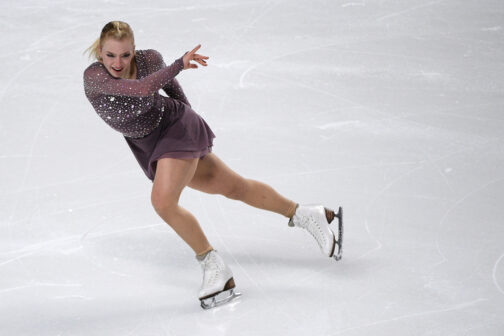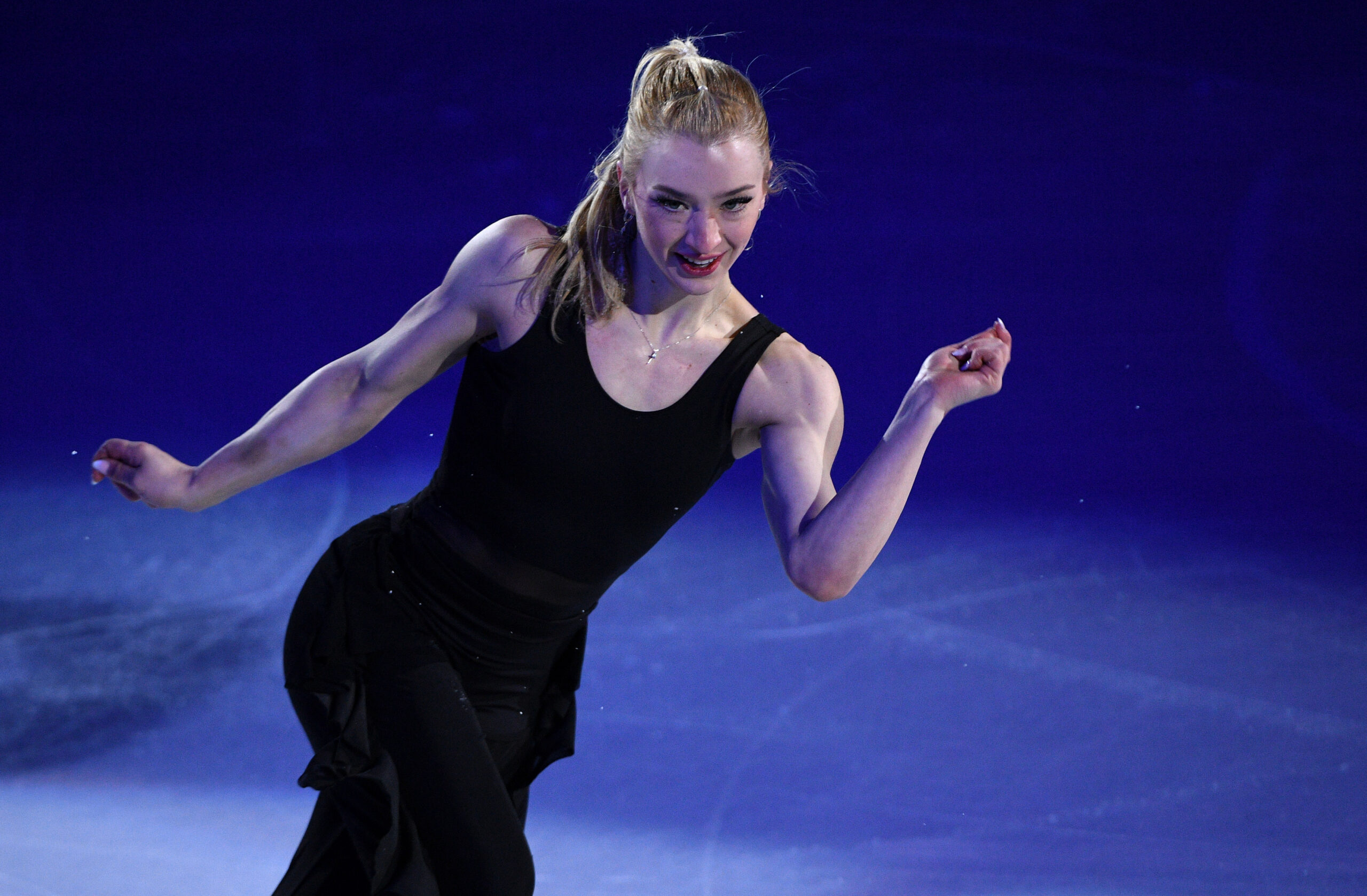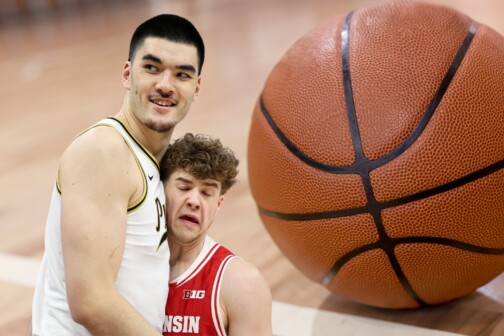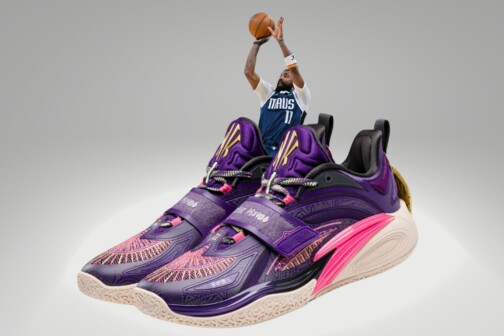Amber Glenn’s short program felt off.
For nearly seven months, she performed, polished, and—in her mind—perfected a new routine choreographed by two-time Olympian Misha Ge. She even achieved an international career-best total score at the 2021 Guaranteed Rate Skate America Grand Prix with the help of that program. Still, something wasn’t sitting right. And with just weeks to go until the 2022 Toyota U.S. Figure Skating Championships, the 22-year-old didn’t have time for something to feel off if she wanted to achieve her goal of making the three-woman U.S. Olympic figure skating team.
Which perhaps begins to explain why, after returning from an event Tokyo, the Plano native tried something different the next time she took the ice to train. On went “Scars” by Madilyn Bailey, the song she used for her short program from the 2020 and 2021 competitive seasons, which she self-choreographed with the help of Cordero Zuckerman, better known as Denali Foxx from season 13 of RuPaul’s Drag Race. Everything clicked.
“I put on ‘Scars’ and I went out and it was like I didn’t even have to think—my body just did it,” Glenn says. “I was so happy, and I was like, ‘This is what I want my possible Olympic moment to be—just to be skating to something that has a message that I have been trying to send over these last couple of years.’ That is truly me and not me trying to be something else.”
She speaks from experience. Glenn has become one of the best skaters in the country, a silver medalist at last year’s national championships and a strong contender to make this year’s Olympic team. That only came after accepted and embraced herself. In December of 2019, she came out as bisexual and pansexual. Her silver medal at the 2021 U.S. Figure Skating Championships marked the first time an LGBTQIA+ woman had reached the podium at nationals.
“It was a world of difference,” Glenn says. “I no longer felt like I was trying to convey myself as something I wasn’t. I felt like people were finally seeing me for who I was, both off the ice and on.”
Tonight, she’ll take the ice to try and be seen as something entirely new: an Olympian. Nationals have arrived, and with it, the chance to represent her country in Beijing. Already, Glenn has gone further than she once expected she could. But after a fraught journey in the sport, she’s ready to bury her old insecurities once and for all in the name of a brighter future.
“To be able to finally prove myself wrong,” she says, “would just be absolutely incredible.”
As a child, whenever Glenn was asked what she wanted to be when she grew up, she gave an answer was that less a job than an idea. “To do something big,” she’d reply. Figure skating didn’t seem like it, at least not at the start. “She was never the girl that just talked about the Olympics all the time,” says her father, Richard. “She was just so focused on what she was doing in the moment on the ice.”
So it’s fitting that her career began on a whim, too. As a 4-year-old, she first got on the ice at the since-removed rink at the Stonebriar Centre in Frisco when she, her younger sister, and three cousins needed something to do on a rainy afternoon. Ice skating was only meant to be a distraction for a few hours that day—and, for her sister and two of her cousins, it was exactly that. Not Amber. Her parents say now that her passion was evident in her first few moments on skates. “We couldn’t get her off the ice,” Richard says. So back to Stonebriar they went, over and over, until, on one of their trips, a coach approached her parents and suggested they sign her up for learn-to-skate classes. For the next 10 years, the mall would be her home until the rink closed in 2014.
She found a hero in 2002 Olympic gold medalist Sarah Hughes, which gave her her first goal: skate on television. She didn’t know how she’d get there. But she quickly stood out for her determination. “I was the kid who had the helmet and knee pads, I just wanted to throw myself into everything, and it just kind of kept going from there,” Glenn says. “There was no stopping me.”
Before long, the accolades piled up. A silver medal at the national championships as a novice gave way to a gold medal at the junior level. On the ice, she became known for her powerful triple jumps and her impassioned commitment to her choreography. Off of it, she became known for her work ethic. While some of it was innate, she says that the more time she spent toiling away on the ice, the happier her coaches were with her. Glenn relished the positive feedback, however it came, which only made her crave more. So she kept pushing harder, striving to be even better. The hours piled up. She spent less and less time on recovery. She could handle it.
To be able to finally prove myself wrong would just be absolutely incredible.
Then came the burnout. At 15 years old, Glenn’s mind and body were spent. She stepped away from the ice for six months and sought counseling to work through the processes that had pushed her to the breaking point. Deep down she knew she still loved the sport. But it was hard not to resent it, too, after it mushroomed into something that consumed at the cost of a “normal” childhood.
Her parents were at a standstill: “You feel obligated to step in and do something, but we also didn’t want to take that dream from her,” says her mother, Cathlene. Finally, after six months Glenn returned to the ice “just for fun.” She says boredom played a role. So did purpose.
“I just felt sort of empty, like something was missing,” she says. “I had put so much time and effort—basically my entire childhood—into this one thing, and I was just going to let it go. It was really defeating to think of it like that.”
Although she knew she wanted to be back on the ice, when Amber first laced up her skates again she was not sure if she would ever return to competition. It was simply about getting back to skating—to “find the love of the sport she had before,” her father says.
But it had to be different. While she enjoyed being back on the ice, Glenn felt the need for some guidance as she knocked off the rust. She knew a return to her former coaching situation was out of the question, so she overhauled her team, not only with new choreographers Ge and Zuckerman, but new coaches in Darlene and Peter Cain, a husband-and-wife team based in Euless. (Full disclosure: they also coached me for two and a half years of my own competitive career.) Their location was crucial; while many of the country’s top skaters are based in Los Angeles and Colorado Springs, it remains important to Glenn to finish what she started in North Texas.
“Being able to stay at home has meant everything to me,” she says. “I was born and raised here and to be able to stay in this area and have a great training facility and have all these opportunities where everyone I love is located—I can’t even begin to express how lucky I am.”
But how they coach her is even more important than where. With them, Glenn learned a new way to train. She still pushes herself, is still relentless in pursuit of her dream, but not everything has to be a struggle.

“It’s such a change from what I used to have,” Glenn says. “I remember landing a jump at practice one day, and people started clapping, and I was just in shock. I was like, ‘Wait. Why are you clapping?’ But having that support every day has just made a world of difference.”
So has finding the courage to live on her own terms. She first began grappling with her sexuality after she started working with a therapist during her time away from the ice in late 2015. But it wasn’t until she began training with the Cains the following year and gained a publicly out non-binary training mate in Timothy LeDuc that she was finally able to accept herself. Still, it would take three more years before she was ready to come out. By then, she was on a run of middling results at national, leading her to contemplate walking away for good.
Now there was more than just her own career to consider: Glenn knew that she wanted to leave skating a better place than she found it. In 2018, Team USA ice dancer Karina Manta came out as bisexual but had since stepped away from the competitive arena. Glenn says she felt that it was important for the sport to have the visible representation of an out competitive female athlete. She decided she could be that.
“She felt that it was important to be visible in a sport that is so stereotypical, ‘You have to be a pretty princess,’” Cathlene says. She noted, too, the competitive considerations at play. Her daughter was hardly naive to the risks of coming out—“that worry of some of the judges, who maybe aren’t as open-minded, judging her down because they don’t see her as feminine.”
Ultimately, Glenn says both the pros and cons paled in comparison to a simple need to be herself.
“Something I remind myself of often is ‘Don’t set yourself on fire to keep others warm,’” Glenn says. “Sometimes, we give our all to everyone, and then we’re left with nothing—just ashes. Don’t sacrifice yourself to make others comfortable. Be yourself and do what you need to do.”
Since returning to skating in 2016, Glenn’s outlook on the sport and its role in her life has shifted.
“I don’t let it consume me entirely anymore,” she says. “I no longer base my worth off of how well I can ice skate.”
She felt that it was important to be visible in a sport that is so stereotypical, ‘You have to be a pretty princess.’
She has other interests. She’s a budding influencer, with 1.3 million followers on TikTok, where she shares videos of her skating and choreography. She’s a dog mom to a Chihuahua mix named Buster, of whom her mother sends photos to keep Amber’s spirits high during road trips. And, inspired by her own experiences, she’s a mental health advocate.
“Just because someone is a world-class athlete, achieving these amazing things, doesn’t mean that they aren’t dealing with some really big challenges,” she says. “But when I was younger you never really saw elite athletes talk about these things, so I thought that I was the only one struggling. So I like to make it known that it is OK to talk about these things because I feel like it will help younger athletes that feel like I did know that they aren’t alone.”
But she still has dreams on the ice. While she didn’t start out dreaming of the Olympics, it didn’t take her long to latch on to it, even if she never totally expected to get there. That, too, played a role in stepping away from the sport. “I thought I was never going to be good enough.” When she takes the ice this evening in Nashville, she’ll do so to the music that means so much to her, chasing a dream that remains so big but is also beside the larger point. It will be Amber Glenn in her element: baring her scars, knowing she won’t be perfect but putting every bit of herself out there anyway.





